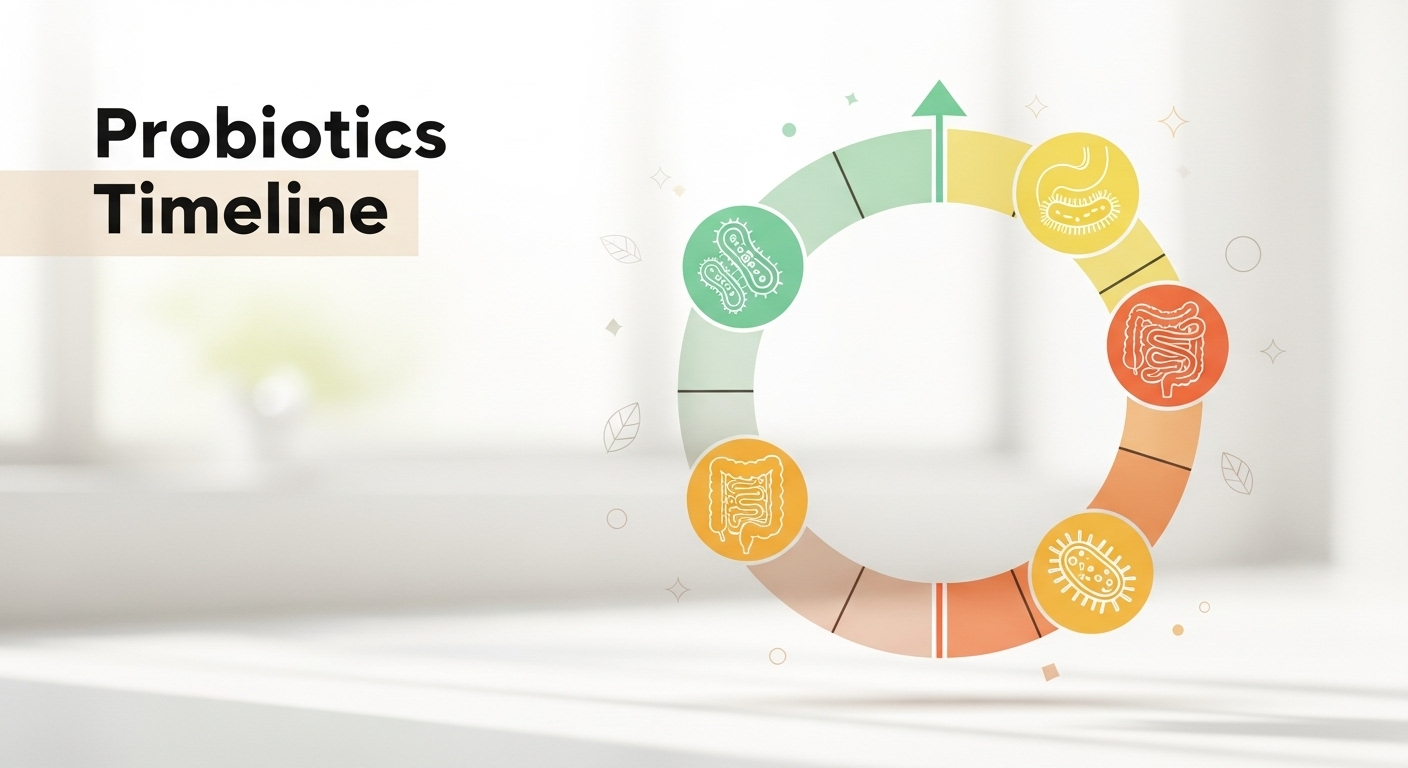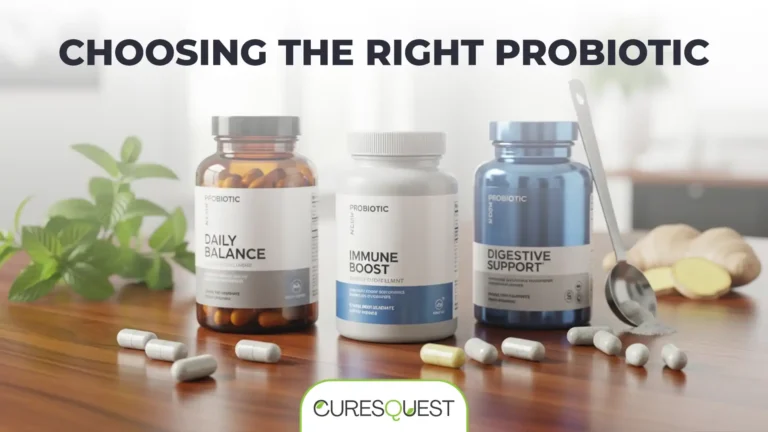If you’re grappling with uncomfortable digestive issues like bloating, gas, constipation, or the unpredictable nature of IBS, you’ve likely heard about probiotics. These beneficial microorganisms are celebrated for their potential to restore balance to your gut and alleviate a host of gastrointestinal woes. But a common and crucial question often arises: how long does it take for probiotics to work for digestive issues? It’s a question without a one-size-fits-all answer, as the timeline can vary significantly based on numerous factors. Understanding these variables is key to setting realistic expectations and maximizing the benefits of your probiotic regimen.
Embarking on a probiotic journey requires patience and consistency. While some individuals might notice subtle changes within days, for many, the path to significant relief is a gradual one, unfolding over weeks or even months. This comprehensive guide will delve into the science behind probiotics, explore the factors that influence their efficacy, provide typical timelines for various digestive conditions, and offer actionable advice to help you achieve optimal gut health.
Table of Contents
Understanding Probiotics and Their Role in Digestive Health
Before we dive into timelines, it’s essential to grasp what probiotics are and how they interact with your digestive system. Your gut is home to trillions of bacteria, fungi, and other microorganisms, collectively known as the gut microbiome. This intricate ecosystem plays a pivotal role not just in digestion, but also in immunity, mood, and overall well-being. When this balance is disrupted – perhaps by stress, diet, antibiotics, or illness – digestive issues can arise.
What Exactly Are Probiotics?
Probiotics are live microorganisms, primarily bacteria and yeasts, that, when administered in adequate amounts, confer a health benefit on the host. Think of them as reinforcements for your gut’s ‘good’ bacteria. They are found in fermented foods like yogurt, kefir, sauerkraut, and kimchi, and are also available as dietary supplements in various forms, including capsules, powders, and liquids.
How Probiotics Support Your Gut Microbiome
Probiotics work through several mechanisms to support your gut and alleviate digestive discomfort. They can:
- Restore Balance: They help re-establish a healthy ratio of beneficial to harmful bacteria in the gut.
- Produce Beneficial Substances: Some strains produce short-chain fatty acids (SCFAs) like butyrate, which nourish gut cells and reduce inflammation.
- Strengthen the Gut Barrier: They can enhance the integrity of the intestinal lining, preventing ‘leaky gut’ and reducing the passage of toxins into the bloodstream.
- Aid Digestion: Certain probiotics assist in breaking down food and absorbing nutrients more efficiently.
- Modulate Immunity: A significant portion of your immune system resides in your gut, and probiotics can help regulate immune responses.
The Varied Timeline: When to Expect Probiotic Benefits
The question of how long does it take for probiotics to work for digestive issues is complex because the answer depends on a confluence of individual and product-specific factors. There’s no universal switch that flips on at a precise moment.
Immediate vs. Gradual Effects: Setting Realistic Expectations
Some people might experience subtle changes within a few days, such as a slight improvement in bowel regularity or reduced bloating. These initial effects are often due to the probiotics beginning to colonize the gut and interact with the existing microbiome. However, for more significant and lasting relief from chronic digestive problems, a longer commitment is usually required. Most studies and clinical experiences suggest that the full benefits of probiotics typically become noticeable after consistent use over several weeks or even a few months.
Factors Influencing Probiotic Efficacy
Understanding these variables can help you manage your expectations and optimize your probiotic experience:
- Diet and Lifestyle: Your overall diet plays a crucial role. A diet rich in processed foods, sugar, and unhealthy fats can counteract the beneficial effects of probiotics. Conversely, a diet high in fiber (prebiotics), fruits, and vegetables can support the growth and activity of these beneficial bacteria. Stress levels, sleep quality, and physical activity also impact gut health.
- Severity of Digestive Issue: Mild, acute issues (like temporary diarrhea) might respond more quickly than chronic, deeply rooted problems such as Irritable Bowel Syndrome (IBS) or Small Intestinal Bacterial Overgrowth (SIBO). The more entrenched the imbalance, the longer it will likely take to see substantial improvement in your digestive system.
- Probiotic Strain and Dosage: Not all probiotics are created equal. Different strains offer different benefits. For example, Lactobacillus rhamnosus GG is well-researched for diarrhea, while certain Bifidobacterium strains are more effective for constipation or IBS. The dosage (measured in CFUs – Colony Forming Units) also matters; higher, clinically effective doses are often necessary for therapeutic effects.
- Individual Gut Microbiome Composition: Everyone’s gut microbiome is unique, like a fingerprint. What works wonders for one person might have minimal impact on another. The existing diversity and composition of your gut flora will influence how new probiotic strains integrate and function.
- Consistency of Use: Probiotics need to be taken consistently as directed. Skipping doses or stopping too soon can hinder their ability to establish themselves and exert their full benefits. Think of it as nurturing a garden; consistent care yields the best results.
Typical Timelines for Specific Digestive Issues
While individual responses vary, here’s a general overview of how long it might take for probiotics to work for specific digestive issues, based on scientific research and clinical observations:
| Digestive Issue | Typical Onset of Relief | Full Benefits Expected | Key Probiotic Strains Often Used |
|---|---|---|---|
| Bloating & Gas | A few days to 2 weeks | 2-4 weeks | Lactobacillus acidophilus, Bifidobacterium lactis |
| Constipation | 1-2 weeks | 3-6 weeks | Bifidobacterium lactis, Lactobacillus reuteri |
| Diarrhea (Acute) | 1-3 days | 1 week | Saccharomyces boulardii, Lactobacillus rhamnosus GG |
| IBS Symptoms | 2-4 weeks | 6-12 weeks | Lactobacillus plantarum 299v, Bifidobacterium infantis 35624 |
| General Digestion & Gut Balance | 1-3 weeks | 4-8 weeks | Broad-spectrum blends |
Irritable Bowel Syndrome (IBS)
IBS is a complex condition, and relief often takes longer. For individuals seeking to understand how long does it take for probiotics to work for digestive issues related to IBS, studies suggest that consistent use for 6-12 weeks is often needed to see significant improvements in symptoms like abdominal pain, bloating, and altered bowel habits. Specific strains like Bifidobacterium infantis 35624 and Lactobacillus plantarum 299v have shown promise.
Bloating and Gas
For common issues like bloating and gas, you might notice initial changes within a few days to two weeks. The full benefits, such as a significant reduction in discomfort, often manifest after 2-4 weeks of consistent probiotic use. Probiotics help by breaking down undigested food and reducing gas-producing bacteria.
Constipation
If constipation is your primary concern, expect to see improvements in bowel regularity within 1-2 weeks. However, achieving sustained, comfortable bowel movements typically requires 3-6 weeks of consistent supplementation. Strains like Bifidobacterium lactis are particularly effective in increasing stool frequency and improving consistency.
Diarrhea (Antibiotic-Associated & Acute)
Probiotics are often recommended to prevent or treat antibiotic-associated diarrhea. In these cases, effects can be relatively quick, sometimes within 1-3 days of starting the probiotic alongside antibiotics. For acute diarrhea from other causes, relief can also be seen within a few days to a week. Saccharomyces boulardii and Lactobacillus rhamnosus GG are frequently used for this purpose.
General Digestive Discomfort
For those looking to improve overall digestive function, reduce occasional discomfort, or simply maintain a healthy gut microbiome, initial benefits might appear within 1-3 weeks, with more robust and consistent improvements taking 4-8 weeks. This general support helps in balancing gut flora and enhancing digestive processes.

Recognizing That Probiotics Are Working (Or Not)
It’s important to pay attention to your body’s signals to determine if your probiotic regimen is effective. Knowing what to look for can help you assess the impact of your chosen supplement.
Signs of Improvement
When probiotics begin to work, you might experience several positive changes:
- Reduced Bloating and Gas: Less abdominal distension and fewer episodes of excessive gas.
- More Regular Bowel Movements: For constipation, an increase in frequency and ease of passage. For diarrhea, more consistent and formed stools.
- Decreased Abdominal Pain/Discomfort: A noticeable reduction in the intensity or frequency of gut-related pain.
- Improved Digestion: Feeling lighter after meals, less indigestion, and better nutrient absorption.
- Enhanced Energy and Mood: A healthier gut can positively impact overall energy levels and even mental well-being.
Initial Side Effects and Adjustment Period
It’s not uncommon to experience some mild side effects when first starting probiotics, particularly if your gut microbiome is significantly imbalanced. These can include temporary bloating, gas, or mild digestive upset. This is often referred to as a ‘die-off’ or ‘adjustment’ period, as the new bacteria compete with existing ones. These symptoms typically subside within a few days to a week. If they persist or worsen, it might be a sign that the probiotic isn’t suitable for you, or the dosage is too high.
When to Consult a Doctor
While probiotics are generally safe, they are not a cure-all. If your digestive issues persist, worsen, or are accompanied by severe symptoms like fever, blood in stool, unexplained weight loss, or persistent vomiting, it’s crucial to consult a healthcare professional. They can help diagnose underlying conditions and provide personalized guidance on how to manage your digestive health effectively.
Maximizing the Effectiveness of Your Probiotic Supplement
To ensure you’re giving your probiotics the best chance to work, consider these strategies:
Choosing the Right Probiotic Strain
Research is key. Don’t just pick any probiotic. Look for supplements that list specific strains (e.g., Lactobacillus acidophilus NCFM, not just Lactobacillus acidophilus) and have been clinically studied for your particular digestive concern. A reputable brand will provide this information. For more on choosing the right probiotic, explore our detailed guide. Explore our guide to selecting the ideal probiotic for your needs.
Proper Dosage and Administration
Follow the manufacturer’s dosage instructions carefully. Some probiotics are best taken with food, others on an empty stomach. Pay attention to storage instructions, as some require refrigeration to maintain potency. Higher CFU counts aren’t always better; the right strain at the right dose is more important.
Complementary Lifestyle and Dietary Changes
Probiotics work best when supported by a gut-friendly lifestyle. This includes a diet rich in whole foods, fiber (prebiotics), and fermented foods. Reducing intake of processed foods, sugar, and artificial sweeteners can significantly help. Regular exercise, adequate sleep, and stress management are also vital components of a healthy gut. Discover foods that naturally support your digestive system by checking out our article on dietary changes for digestive health. Learn more about the complex world within you by understanding your gut microbiome.
Patience and Consistency Are Key
Remember that building a healthy gut takes time. Commit to a consistent probiotic regimen for at least 4-8 weeks before evaluating its effectiveness. If you don’t see results after a reasonable period, consider trying a different strain or consulting with a healthcare professional or registered dietitian.

Frequently Asked Questions About Probiotics and Digestion
Can I take probiotics indefinitely?
For many people, taking probiotics indefinitely is safe and can be beneficial for maintaining gut health, especially if you have chronic digestive issues or are frequently exposed to factors that disrupt your microbiome (e.g., stress, poor diet). However, it’s always best to discuss long-term use with your healthcare provider.
Are there any side effects when starting probiotics?
Yes, some people may experience mild, temporary side effects like bloating, gas, or mild digestive upset when first starting probiotics. These symptoms typically subside within a few days to a week as your gut adjusts. If side effects are severe or persistent, discontinue use and consult a doctor.
What’s the best time of day to take probiotics?
The optimal time can vary by product and strain. Some research suggests taking probiotics with a meal or 30 minutes before a meal can help them survive stomach acid better. Always follow the specific instructions on your probiotic supplement packaging.
Do probiotics need to be refrigerated?
Some probiotic strains are more sensitive to heat and moisture and require refrigeration to maintain their potency. Others are shelf-stable due to advanced manufacturing processes. Always check the product label for specific storage instructions to ensure maximum efficacy.
Can diet alone provide enough probiotics?
While fermented foods like yogurt, kefir, sauerkraut, and kimchi are excellent sources of natural probiotics, they may not provide the specific strains or high CFU counts found in supplements. For therapeutic purposes or specific digestive issues, a targeted probiotic supplement is often recommended in addition to a gut-healthy diet.
How do I know if I’m taking the right probiotic?
The ‘right’ probiotic depends on your specific digestive issue and individual gut microbiome. Look for supplements with clinically studied strains that target your symptoms. If you’re unsure, consult a healthcare professional or a registered dietitian who specializes in gut health for personalized recommendations.
What if probiotics don’t seem to work for me?
If you’ve consistently taken a probiotic for 4-8 weeks and haven’t noticed any improvement, consider these steps: ensure your diet and lifestyle support gut health, try a different probiotic strain or brand, or consult a healthcare professional. There might be an underlying issue that needs medical attention, or a different approach to gut health may be necessary.
Conclusion
Understanding how long does it take for probiotics to work for digestive issues is crucial for a successful gut health journey. While initial changes might be felt within days, significant and lasting relief typically requires consistent use over several weeks or even months, depending on the individual and the specific condition. By choosing the right strains, maintaining a supportive diet and lifestyle, and exercising patience, you can empower your gut to find its balance and experience the profound benefits these tiny microbes have to offer. Remember, a healthy gut is a cornerstone of overall well-being, and your commitment to nurturing it will yield lasting rewards.









